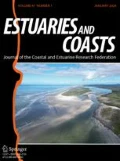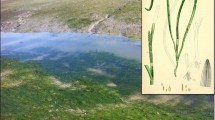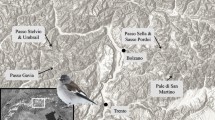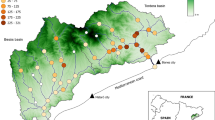Abstract
Urban and artificial structures are increasingly added to the world’s coasts during a time in which changing climate is forecast to drive shifts in naturally occurring habitats. We ask whether the role of artificial structures as marine habitats will increase in importance relative to their natural counterparts, particularly as natural habitats are negatively affected by ocean warming and acidification. To evaluate this model, we contrasted use of natural (kelp forest and turfing algae) and artificial habitat (plastic pier-piling) by a nest-building amphipod (Cymadusa pemptos) under current and future climate conditions of CO2 and temperature. Under future conditions, amphipod populations in mesocosms increased, but this did not lead to greater proportional colonization of kelp and turf. Instead, colonization doubled in artificial habitats, and there was increasing production and occupation of nests on artificial habitats relative to natural habitats. In an age when human modification of natural substrata is increasingly cited as an agent of wildlife decline, understanding the future role of artificial habitats as replacement dwellings for natural habitats is critical. We pioneer an understanding of the future role of natural and artificial habitats, identifying the possibility that the role of urban structures as marine habitats may only increase.


Similar content being viewed by others
References
Appadoo, C., and A.A. Myers. 2003. Observations on the tube-building behaviour of the marine amphipod Cymadusa filosa Savigny (Crustacea: Ampithoidae). Journal of Natural History 37 (18): 2151–2164. https://doi.org/10.1080/00222930210147368.
Borowsky, B. 1983. Reproductive behavior of three tube-building peracarid crustaceans: the amphipods Jassa falcata and Ampithoe valida and the tanaid Tanais cavolinii. Marine Biology 77 (3): 257–263. https://doi.org/10.1007/BF00395814.
Brawley, S.H., and W.H. Adey. 1981. The effect of micrograzers on algal community structure in a coral reef microcosm. Marine Biology 61 (2–3): 167–177. https://doi.org/10.1007/BF00386656.
Brodie, J., C.J. Williamson, D.A. Smale, N.A. Kamenos, N. Mieszkowska, R. Santos, M. Cunliffe, M. Steinke, C. Yesson, K.M. Anderson, V. Asnaghi, C. Brownlee, H.L. Burdett, M.T. Burrows, S. Collins, P.J.C. Donohue, B. Harvey, A. Foggo, F. Noisette, J. Nunes, F. Ragazzola, J.A. Raven, D.N. Schmidt, D. Suggett, M. Teichberg, and J.M. Hall-Spencer. 2014. The future of the northeast Atlantic benthic flora in a high CO2 world. Ecology and Evolution 4 (13): 2787–2798. https://doi.org/10.1002/ece3.1105.
Bulleri, F., and M.G. Chapman. 2010. The introduction of coastal infrastructure as a driver of change in marine environments. Journal of Applied Ecology 47 (1): 26–35. https://doi.org/10.1111/j.1365-2664.2009.01751.x.
Cappuccino, N., H. Damman, and J.-F. Dubuc. 1995. Population dynamics new approaches and synthesis. San Diego: Academic Press.
Chapman, M.G. 2003. Paucity of mobile species on constructed seawalls: effects of urbanization on biodiversity. Marine Ecology Progress Series 264: 21–29. https://doi.org/10.3354/meps264021.
Connell, S.D., and T.M. Glasby. 1999. Do urban structures influence local abundance and diversity of subtidal epibiota? A case study from Sydney Harbour, Australia. Marine Environmental Research 47 (4): 373–387. https://doi.org/10.1016/S0141-1136(98)00126-3.
Connell, S.D., and B.D. Russell. 2010. The direct effects of increasing CO2 and temperature on non-calcifying organisms: Increasing the potential for phase shifts in kelp forests. Proceedings of the Royal Society B: Biological Sciences. 277 (1686): 1409–1415. https://doi.org/10.1098/rspb.2009.2069.
Connell, S.D., K.J. Kroeker, K.E. Fabricius, D.I. Kline, and B.D. Russell. 2013. The other ocean acidification problem: CO2 as a resource among competitors for ecosystem dominance. Philosophical Transactions of the Royal Society B 368 (1627): 20120442. https://doi.org/10.1098/rstb.2012.0442.
Connell, S.D., M.S. Foster, and L. Airoldi. 2014. What are algal turfs? Towards a better description of turfs. Marine Ecology Progress Series 495: 299–307. https://doi.org/10.3354/meps10513.
Connell, S.D., Z.A. Doubleday, S.B. Hamlyn, N.R. Foster, C.D.G. Harley, B.P. Kelaher, I. Nagelkerken, G. Sara, and B.D. Russell. 2017. How ocean acidification can benefit calcifiers. Current Biology 27: R83–R102.
Cothran, R.D., and P.D. Jeyasingh. 2010. Condition dependence of a sexually selected trait in a crustacean species complex: importance of the ecological context. Evolution 64 (9): 2535–2546. https://doi.org/10.1111/j.1558-5646.2010.00998.x.
Cothran, R.D., A.R. Stiff, P.D. Jeyasingh, and R.A. Relyea. 2012. Eutrophication and predation risk interact to affect sexual trait expression and mating success. Evolution 66 (3): 708–719. https://doi.org/10.1111/j.1558-5646.2011.01475.x.
Dafforn, K.A., E.L. Johnston, and T.M. Glasby. 2009. Shallow moving structures promote marine invader dominance. Biofouling 25 (3): 277–287. https://doi.org/10.1080/08927010802710618.
Dafforn, K.A., T.M. Glasby, L. Airoldi, N.K. Rivero, M. Mayer-Pinto, and E.L. Johnston. 2015. Marine urbanization: an ecological framework for designing multifunctional artificial structures. Frontiers in Ecology and the Environment 13 (2): 82–90. https://doi.org/10.1890/140050.
Denno, R.F., and G.K. Roderick. 1992. Density-related dispersal in planthoppers—effects of interspecific crowding. Ecology 73 (4): 1323–1334. https://doi.org/10.2307/1940679.
Dick, J.T.A., S.E. Faloon, and R.W. Elwood. 1998. Active brood care in an amphipod: influences of embryonic development, temperature and oxygen. Animal Behaviour 56 (3): 663–672. https://doi.org/10.1006/anbe.1998.0797.
Dixon, I.M.T., and P.G. Moore. 1997. A comparative study on the tubes and feeding behaviour of eight species of corophioid amphipoda and their bearing on phylogenetic relationships within the Corophioidea. Philosophical Transactions: Biological Sciences 352 (1349): 93–112. https://doi.org/10.2307/56452
Doney, S.C., M. Ruckelshaus, J.E. Duffy, J.P. Barry, F. Chan, C.A. English, H.M. Galindo et al. 2012. Climate change impacts on marine ecosystems. Annual review of marine science 4 (1): 11–37. https://doi.org/10.1146/annurev-marine-041911-111611
Duffy, J.E. 1990. Amphipods on seaweeds: partners or pests? Oecologia 83 (2): 267–276. https://doi.org/10.1007/BF00317764.
Falkenberg, L.J., B.D. Russell, and S.D. Connell. 2013. Contrasting resource limitations of marine primary producers: implications for competitive interactions under enriched CO2 and nutrient regimes. Oecologia 172 (2): 575–583. https://doi.org/10.1007/s00442-012-2507-5.
Falkenberg, L.J., B.D. Russell, and S.D. Connell. 2016. Design and performance evaluation of a mesocosm facility and techniques to simulate ocean acidification and warming. Limnology & Oceanography: Methods 14: 278–291. https://doi.org/10.1002/lom3.10088.
Flather, C.H., and M. Bevers. 2002. Patchy reaction-diffusion and population abundance: the relative importance of habitat amount and arrangement. American Naturalist 159 (1): 40–56. https://doi.org/10.1086/324120.
Franz, D.R. 1989. Population density and demography of a fouling community amphipod. Journal of Experimental Marine Biology and Ecology 125 (2): 117–136. https://doi.org/10.1016/0022-0981(89)90038-5.
Garrard, S.L., M. Cristina Gambi, M. Beatrice Scipione, F.P. Patti, M. Lorenti, V. Zupo, D.M. Paterson, and M. Cristina Buia. 2014. Indirect effects may buffer negative responses of seagrass invertebrate communities to ocean acidification. Journal of Experimental Marine Biology and Ecology 461: 31–38. https://doi.org/10.1016/j.jembe.2014.07.011.
Glasby, T.M., and S.D. Connell. 1999. Urban structures as marine habitats. Ambio 28 (7): 595–598. https://doi.org/10.2307/4314964.
Gorman, D., and S.D. Connell. 2009. Recovering subtidal forests in human-dominated landscapes. Journal of Applied Ecology 46 (6): 1258–1265. https://doi.org/10.1111/j.1365-2664.2009.01711.x.
Greene, J.K., and R.E. Grizzle. 2007. Successional development of fouling communities on open ocean aquaculture fish cages in the western Gulf of Maine, USA. Aquaculture 262 (2–4): 289–301. https://doi.org/10.1016/j.aquaculture.2006.11.003.
Harley, C.D., S.D. Connell, Z.A. Doubleday, B. Kelaher, B.D. Russell, G. Sarà, and B. Helmuth. 2017. Conceptualizing ecosystem tipping points within a physiological framework. Ecology and Evolution 9: 225–241. https://doi.org/10.1111/j.1461-0248.2005.00871.x
Hauton, C., T. Tyrrell, and J. Williams. 2009. The subtle effects of sea water acidification on the amphipod Gammarus locusta. Biogeosciences 6 (8): 1479–1489. https://doi.org/10.5194/bg-6-1479-2009.
Heldt, K.A., S.D. Connell, K. Anderson, B.D. Russell, and P. Munguia. 2016. Future climate stimulates population out-breaks by relaxing constraints on reproduction. Scientific Reports 6 (1): 33383. https://doi.org/10.1038/srep33383.
IPPC. 2007. Climate change 2007: the physical science basis. Contribution of working group I to the fourth assessment report of the intergovernmental panel on climate change. eds. S. Solomon, D. Qin, M. Manning, Z. Chen, M. Marquis, K.B. Averyt, M. Tignor, and H.L. Miller. Cambridge, United Kingdom and New York, NY: Cambridge University Press.
Kitting, C.L., B. Fry, and M.D. Morgan. 1984. Detection of inconspicuous epiphytic algae supporting food webs in seagrass meadows. Oecologia 62 (2): 145–149. https://doi.org/10.2307/4217296.
Lidbury, I., V. Johnson, J.M. Hall-Spencer, C.B. Munn, and M. Cunliffe. 2012. Community-level response of coastal microbial biofilms to ocean acidification in a natural carbon dioxide vent ecosystem. Marine Pollution Bulletin 64 (5): 1063–1066. https://doi.org/10.1016/j.marpolbul.2012.02.011.
Lloyd, M. 1967. Mean crowding. Journal of Animal Ecology 36 (1): 1–30. https://doi.org/10.2307/3012.
Mineur, F., E.J. Cook, D. Minchin, and C.A. Maggs. 2012. Changing coasts: marine aliens and artificial structures. Oceanography and Marine Biology 50: 189–234. https://doi.org/10.1201/b12157-5.
Munguia, P. 2004. Successional patterns on pen shell communities at local and regional scales. Journal of Animal Ecology 73 (1): 64–74. https://doi.org/10.1111/j.1365-2656.2004.00778.x.
Munguia, P. 2014. Life history affects how species experience succession in pen shell metacommunities. Oecologia 174 (4): 1335–1344. https://doi.org/10.1007/s00442-013-2849-7.
Munguia, P. 2015. Role of sources and temporal sinks in a marine amphipod. Biology Letters 11 (2): 20140864. https://doi.org/10.1098/rsbl.2014.0864.
Munguia, P., C. Mackie, and R. Levitan Don. 2007. The influence of stage-dependent dispersal on the population dynamics of three amphipod species. Oecologia 153 (3): 533–541. https://doi.org/10.2307/40213002.
Munguia, P., R.W. Osman, J. Hamilton, R. Whitlatch, and R. Zajac. 2011. Changes in habitat heterogeneity alter marine sessile benthic communities. Ecological Applications 21 (3): 925–935. https://doi.org/10.1890/09-2398.1.
Nagelkerken, I., and S.D. Connell. 2015. Global alteration of ocean ecosystem functioning due to increasing human CO2 emissions. Proceedings of the National Academy of Sciences 112 (43): 13272–13277. https://doi.org/10.1073/pnas.1510856112.
Nagelkerken, I., and P.L. Munday. 2016. Animal behaviour shapes the ecological effects of ocean acidification and warming: moving from individual to community-level responses. Global Change Biology 22 (3): 974–989. https://doi.org/10.1111/gcb.13167.
Norderhaug, K.M., H. Christie, and E. Rinde. 2002. Colonisation of kelp imitations by epiphyte and holdfast fauna; a study of mobility patterns. Marine Biology 141 (5): 965–973. https://doi.org/10.1007/s00227-002-0893-7.
Poore, A.G.B. 2005. Scales of dispersal among hosts in a herbivorous marine amphipod. Austral Ecology 30 (2): 219–228. https://doi.org/10.1111/j.1442-9993.2005.01439.x.
Poore, A.G.B., and P.D. Steinberg. 1999. Preference–performance relationships and effects of host plant choice in an herbivorous marine amphipod. Ecological Monographs 69: 443–464. https://doi.org/10.1890/0012-9615(1999)069[0443:PPRAEO]2.0.CO;2.
Ronce, O. 2007. How does it feel to be like a rolling stone? Ten questions about dispersal evolution. Annual Review of Ecology Evolution and Systematics 38 (1): 231–253. https://doi.org/10.1146/annurev.ecolsys.38.091206.095611.
Russell, B.D., J.-A.I. Thompson, L.J. Falkenberg, and S.D. Connell. 2009. Synergistic effects of climate change and local stressors: CO2 and nutrient-driven change in subtidal rocky habitats. Global Change Biology 15 (9): 2153–2162. https://doi.org/10.1111/j.1365-2486.2009.01886.x.
Sainte-Marie, B. 1991. A review of the reproductive bionomics of aquatic gammaridean amphipods: variation of life history traits with latitude, depth, salinity and superfamily. Hydrobiologia 223 (1): 189–227. https://doi.org/10.1007/BF00047641.
Scheffer, M., S. Carpenter, J.A. Foley, C. Folke, and B. Walker. 2001. Catastrophic shifts in ecosystems. Nature 413 (6856): 591–596.
Skutch, A.F. 1926. On the habits and ecology of the tube-building amphipod Amphithoe rubricata Montagu. Ecology 7 (4): 481–502. https://doi.org/10.2307/1931173.
Sorte, C.J.B., S.L. Williams, and R.A. Zerebecki. 2010. Ocean warming increases threat of invasive species in a marine fouling community. Ecology 91 (8): 2198–2204. https://doi.org/10.1890/10-0238.1.
Valdivia, N., C. Buschbaum, and M. Thiel. 2014. Succession in intertidal mussel bed assemblages on different shores: species mobility matters. Marine Ecology Progress Series 497: 131–142. https://doi.org/10.3354/meps10593.
Acknowledgements
We thank the Marine Experiments for a Sustainable Outcome (MESO) team and K. Anderson (University BC, Canada), who assisted with the establishment and maintenance of tanks and microcosms.
Funding
The Australian Research Council funded MESO through a Future Fellowship to S.D.C. (grant no. FT0991953).
Author information
Authors and Affiliations
Corresponding author
Additional information
Communicated by Masahiro Nakaoka
Rights and permissions
About this article
Cite this article
Heldt, K.A., Connell, S.D. & Munguia, P. Increasing Use of Human-Dominated Habitats as CO2 Emissions Warm and Acidify Oceans. Estuaries and Coasts 41, 1660–1666 (2018). https://doi.org/10.1007/s12237-018-0386-7
Received:
Revised:
Accepted:
Published:
Issue Date:
DOI: https://doi.org/10.1007/s12237-018-0386-7




